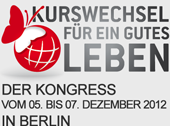Prevention of work-related stress needs
shop floor initiatives and obligatory
regulation. Klaus Pickshaus, Director
Work Structuring and Vocational
Training Politics Directorate, explains
the position of IG Metall.
Work-related stress is "one of the biggest health problems in the 21st century", declares World Health Organization. After the great financial and economic crises enterprise restructuring accelerates and as a result work intensification and work-related stress is increasing.
The European social partners’ Framework Agreement on Work-related Stress of 2004 argues: "Work-related stress can be caused by different factors such as work content, work organisation, work environment, poor communication. If a problem of work-related stress is identified, action must be taken to prevent, eliminate or reduce it."
The European Survey of Enterprises on New and Emerging Risks (ESENER) noticed that 79% of European managers are concerned by work-related stress, but less than a third of companies have set procedures ready to deal with it. Especially in Germany the establishment with procedure to deal with work-related stress is unfulfilled. If we look what are the main drivers for better prevention the ESENER Survey gives the following answers: The major reasons for addressing psychosocial risks in the establishment are at first (63 %) the fulfilment of legal obligations and secondly (36 %) the requests of employees or their representatives.
But the range of shop floor initiatives will remain limited if there is not enough pressure by obligatory regulation. The Report of the European Commission on the implementation of the Framework Agreement on Work-related Stress in February 2011 shows that many EU-member states improved the national regulation on work-related stress.
The conclusion from the IG Metall point of view is: We need better and more obligatory regulation to force and support shop floor initiatives for prevention.
IG Metall has developed a tool: It is called "stressbarometer" which is ment to support works councils. And, to close the gap in legislation concerning psychosocial risks, IG Metall has started the "Anti-Stress-Initiative" to forward this part of health management as an obligatory regulation.
For detailed data see DGB-Index Good Work: Download PDF



